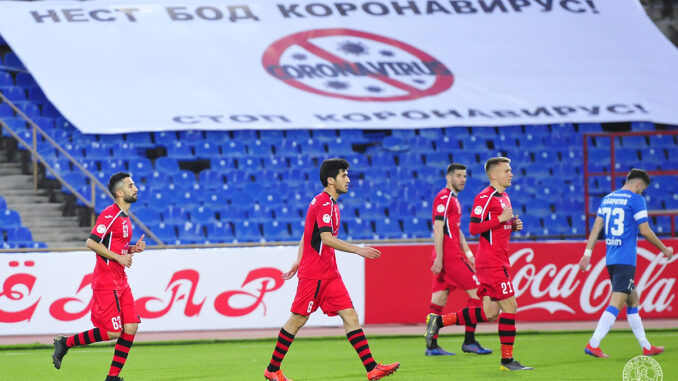
This week’s major news story in Asian football features the long awaited return of the K League, whilst those in Europe are left salivating by the news of the German Budnesliga’s resumption by the middle of the month.
Yet while the world of football slowly starts to resemble an image of what it was before, another league is instead heading in the opposite direction, having been emphatically cut down by the COVID-19 pandemic in the last fortnight.
In an ideal world, Tajik football was set to resume this weekend, having called a temporary halt to proceedings two weeks ago. However, with the country’s first confirmed cases of Coronavirus publicised in the last week, the quick spread has justifiably curtailed hopes of the domestic Higher League returning any time soon.
It looks likely then, that Tajikistan’s brief place in the global sporting spotlight, as one of only a handful of active leagues globally, has come to a premature end. But it leaves a lasting legacy which will be felt in the country for months and possibly years to come.
In retrospect, April 2020 will be condemned to the history books as a black spot for sport as a whole. Lockdowns and social distancing the world over forced into action by the COVID-19 outbreak, cancelled all manner of mass gatherings and sporting events, including the vast majority of global domestic football campaigns.
Tajik football in that regard lept forward into an empty market as a shining light, kick starting their campaign on the 5 April, becoming the only active Asian league to run at the time.
Far from a glamourous name, even regionally let alone continentally or internationally, the PR exercise that encircled the league was indeed well maintained. This was one of few outlets sports fans had across the world, and the Tajik Football Federation (TFF) knew it, milking it’s exposure for all it was worth.
With a myriad of elaborate Tifos and advertising board messages in place from the first week of play including; “Tajikistan says no to coronavirus”, ”We love you (healthcare workers)”, “Stay strong Spain! Tajikistan is Praying for You”, “Stay strong brother nations (Russia, Uzbekistan, China, Kazakhstan, Kyrgyzstan, Afghanistan” & “Your football is our inspiration, Stay strong Spain”; the world of Tajik football felt ever more isolated from reality.
A nation projected as a utopian state untouched by the global panic, yet to experience a confirmed case of a devastating deadly disease, but offering so much sympathy and crucially entertainment to a wider audience far past its borders.
Unlike their Central Asian neighbours Turkmenistan, whose Yokary Liga championship has continued on pretty much unabated over the same period, Tajik football has been relatable and more importantly accessible to the wider public.
As the K League has benefited from in the last two weeks, TV rights have soared in demand given the limited supply. Broadcasters from all over were in conversations with the TFF about acquiring TV rights, while sports betting companies raced in to endorse club teams with their moniker, seizing their own slice of a reduced market.
Tajik football’s reputation changed overnight, from a footballing backwater, riddled with accusations of corruption and vast disparities in wealth, to a comparable “home-from-home” competition, with a heavy and well managed social media presence, accessible live matches, bite-size video content and increasingly some quite decent football.
The league’s narrative on the pitch played to the perfect fairytale story of the establishment vs. the underdog, in the unfolding title fight between Dushanbe giants and six times consecutive champions Istiklol and previously provincial makeweights Khatlon, based out of Bokhtar, a small city with just over 100,000 inhabitants.
The styles of play were similarly appealing; Istiklol steamrolled a few teams early on; recording 7-0 and 6-1 victories in their first four matches; while Khatlon’s avant-gard approach won the neutral backing, and despite conceding seven over their first four, they stay top unbeaten alongside the reigning champions after their impressive 2-2 draw between one another a few weeks back.
There have been some noteworthy individual performances as well; returning Manuchekhr Dzhailov, a cult figure across Asia who has returned home with a flourish for Istiklol with seven goals in his first four matches.
Elsewhere, Parviz Baki-Akhunov, a free running and goal hungry striker, Kuaye Godson, the diminutive but at times heroic Ghanian keeper and Karomatullo Saidov, a 20 year old central midfield star in the making proved there is talent to admire at the previously unfancied Khatlon.
The league as a whole is also considerably young and refreshing; underlined by Lokomotiv-Pamir, the Tajik national youth side project club in all but name, the majority of whom played at last year’s U17 World Cup, a team that regularly averages an age of just over 18 years old.
The star of which, the comparative veteran of the side; 22 year old Shakhrom Sulaimonov, a left winger on loan from Istiklol has already put his marker down by scoring two Goal of the Season contenders in the space of a month.
His movement and ambition for the sensational, offered to him by a club in it for the exposure of talent and minutes rather than domestic success, has made him the biggest find of the campaign so far. A true highlight for the league to prosper from.
But of course, the successes on the pitch have been regrettably counterbalanced by its drawbacks.
Fighting a reputation of interference and corruption has long been a headache for the TFF, and it hasn’t been helped this year as they’ve seemingly prioritised last minute venue switches in favour of their perceived favoured club Istiklol (heavily influenced by the president’s son Rustam Emomali), and facing stern scrutiny for lax officiating, in particular in Istiklol’s second half comeback against Khatlon.
The TFF to their credit have been swift to squash such apparent favours, arranging any fixture switches earlier in the week, and quickly suspending officials for inaccurate calls. While suggestions of foul play were far from blatant in this case, the TFF were keen on illustrating their new transparent approach to a league in prime view.
In addition the issues with having such wide spread exposure have crept in at times. A quick search on social media ahead of any given matchday reveals where the real interest lies in active football, however farflung, and that is in sports betting.
Attraction of vast numbers of punters to a single unfamiliar league has seen the markets react wildly over short time periods, with little in the way of form or real concrete research to invest in from new onlookers, match integrity is regularly being questioned.
It’s a problem that has always come hand-in-hand with Asian football, one which isn’t likely to go away anytime soon. A sudden influx of cash into a league teetering on the edge of semi-pro status is bound to cause a conflict of interests.
Another concerning element, which grew further than that of football, was the more significant and immediate threat of the Coronavirus pandemic.
The virus had been downplayed in Tajikistan for months, to such extent that reports in the last few weeks started to suggest that a cover-up was in operation to brush under the carpet respiratory deaths in remote locations around the country.
The league’s efforts to project a society running business as usual accelerated the government’s position, until the task at hand became all too clear to ignore.
The TFF announced the league’s temporary two week suspension on Saturday, 25 April, but notably insisted that this was a preventative measure rather than a method to slow the spread of a virus they continued to deny existed in Tajikistan.
Five days later, however, their tact changed again as the country confirmed its first 15 cases of the disease, before another 364 new cases and nine deaths over the next seven days.
The country is one of the poorest in Central Asia, with limited medical facilities to fight such a deep and widespread outbreak. Assistance from neighbours and new found friends abroad (making those advertising board communications seem increasingly apt) proving more and more necessary if stabilisation without widespread destruction can be achieved,
With the writing having been on the walls for weeks now, questions will undoubtedly be asked of the league’s decision to continue on for so long.
While the Tajik Higher League now settles in to an extended period of dormancy, the ramifications of its decisions to run, promote and generate significant investment will undoubtedly be weighed against the impact it’s had on its recent suspension and long term economic future of individual clubs.
For it all, the spectacle, the stories, the controversy and the intrigue. A beloved month of Tajik football, will remain in many football fans’ the world over hearts for time to come.
Photo: Tajikistan Football Federation
Listen to our interview with FK Khujand coach Nikola Lazarević from Episode 51 of The Asian Game podcast where we discuss the start of the Tajik Higher League




